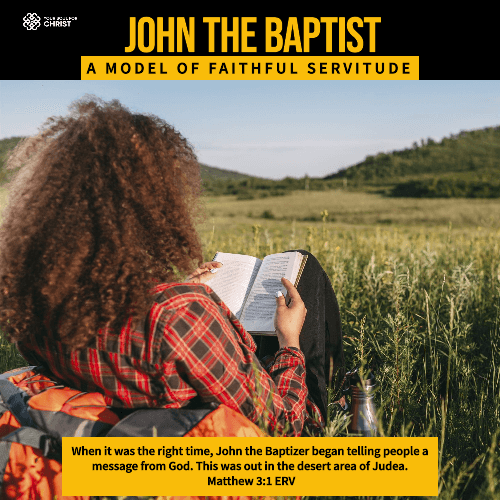When it was the right time, John the Baptizer began telling people a message from God. This was out in the desert area of Judea.
Matthew 3:1 ERV
This verse underscores crucial considerations for every believer, especially those aspiring to be vessels for the Lord. The Bible recounts the beginning of the ministry of John the Baptist, where he delivered God’s message to the people. Importantly, John’s message originated from God, not from his own ideas or desires. He did not enter the ministry for personal gain or self-will but as a dedicated messenger of God.
John the Baptist wasn’t motivated by personal ambition or material gain. He didn’t rely on his own understanding or become a mere motivational speaker. Instead, he had a deep relationship with God, which allowed him to listen and convey God’s message accurately. His words were not his own; he served as a mouthpiece for God’s will, unlike some contemporary ministers who prioritize their own ideas.
This prompts us to reflect on our own relationship with God. Are we attuned to His voice, or are we spiritually deaf? God desires that everyone who serves Him depends entirely on Him, especially for the words they speak. Anyone seeking messages from sources other than God is not truly doing God’s work, regardless of their zeal. The legitimacy of ministry work hinges on whether the message is from God.
Moreover, recognizing the importance of God’s timing is crucial. There is a divinely appointed time for every manifestation. As believers, we must seek not only to hear from God but also to understand His timing and guidance for our lives. The effectiveness of a message depends on both its divine source and its timing. Acting outside of God’s will and timing equates to pursuing self-driven missions rather than God’s purpose.
Another critical lesson from this verse is about John the Baptist’s mission field. The Bible states that he preached in the desert area of Judea. Despite the inhospitable environment, the desert was where God wanted John to deliver His message. This aligns with Jesus’ words in Matthew 11:7-8 “What did you go out into the wilderness to see? … a man dressed in fine clothes? No, those who wear fine clothes are in king’s palaces. Then what did you go out to see? A prophet? Yes, and I tell you, more than a prophet.” The wilderness was not a place of comfort or luxury, but it was where John fulfilled his divine mission.
Before seeking to elevate ourselves or create our own purpose, we must ensure that we are where God wants us to be. Even if a location or role seems insignificant by human standards, if it is where God has placed us, it is the right place. The plan and purpose of God transcend immediate circumstances. We must strive to understand His will and live according to His purpose.
In conclusion, the life of John the Baptist teaches us about the importance of divine guidance, timing, and commitment to God’s purpose. Despite being in the desert, God provided for John, supplying him with food and clothing. This illustrates the hope and reality for those who trust in God’s plan and counsel. There is no better life than one lived for God, fulfilling His purpose. Let us seek to know His will and live in alignment with His divine plan.
John the Baptist’s ministry exemplifies the importance of divine guidance, timing, and unwavering commitment to God’s purpose. His story encourages us to listen to God’s voice, act according to His timing, and serve Him faithfully, regardless of our circumstances. Trusting in God’s plan brings true fulfilment and purpose to our lives.
